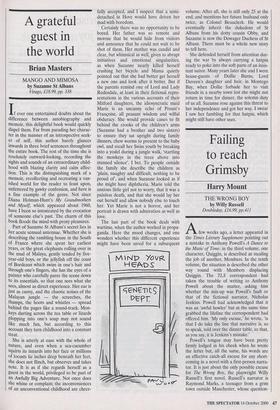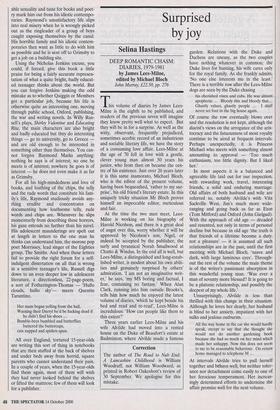Failing to reach Grimsby
Harry Mount
THE WRONG BOY by Willy Russell Doubleday, £16.99, pp.411 Afew weeks ago, a letter appeared in the Times Literary Supplement pointing out a mistake in Anthony Powell's A Dance to the Music of Time: in the third volume, one character, Quiggin, is described as stealing the job of another, Members. In the tenth volume, the situation is described the other way round with Members displacing Quiggin. The TLS correspondent had taken the trouble of writing to Anthony Powell about the matter, asking him whether the mix-up was Powell's fault or that of the fictional narrator, Nicholas Jenkins. Powell had acknowledged that it was an 'awful howler' but at the same time grabbed the lifeline the correspondent had offered him. 'My only excuse,' he wrote, 'is that I do take the line that narrative is, so to speak, told over the dinner table, so that, as you say, it is Jenkins's mistake.'
Powell's tongue may have been pretty firmly lodged in his cheek when he wrote the letter but, all the same, his words are an effective catch-all excuse for any short- coming in a novel with a first-person narra- tor. It is just about the only possible excuse for The Wrong Boy, the playwright Willy Russell's first novel. Russell's narrator is Raymond Marks, a teenager from a grim town outside Manchester, whose question- able sexuality and taste for books and poet- ry mark him out from his idiotic contempo- raries. Raymond's unsatisfactory life slips into real misery when he is wrongly picked out as the ringleader of a group of boys caught exposing themselves by the canal. His horrible family and his idiotic contem- poraries then want as little to do with him as possible and he is sent off to Grimsby to get a job on a building site.
Using the Nicholas. Jenkins excuse, you could, if forced, give this book a little praise for being a fairly accurate represen- tation of what a quite bright, badly educat- ed teenager thinks about the world. But you can forgive Jenkins making the odd mistake as to whether Quiggin or Members got a particular job, because his life is otherwise quite an interesting one, moving through public school, Oxford, publishing, the war and writing novels. In Willy Rus- sell's plays, Shirley Valentine and Educating Rita, the main characters are also bright and badly educated but they do interesting things — go to university, go to Greece and are old enough to be interested in something other than themselves. You can- not forgive Raymond Marks anything: nothing he says is of interest; no one he meets is of interest; nowhere he goes is of interest — he does not even make it as far as Grimsby.
For all his high-mindedness and love of books, and loathing of the chips, the telly and the rude words that constitute his fam- ily's life, Raymond studiously avoids any- thing erudite and concentrates on documenting how loathsome telly, rude words and chips are. Whenever he slips momentarily from describing these horrors, his gaze extends no further than his navel. His adolescent maunderings are spelt out at length in letters to the one man he thinks can understand him, the morose pop poet Morrissey, lead singer of the Eighties group, The Smiths. And when these letters fail to provide the right forum for a self- indulgent dissertation on all that is wrong in a sensitive teenager's life, Russell digs down to an even deeper low in adolescent literature, a directionless, 22-page-poem, a sort of Fotherington-Thomas 'Hullo clouds, hullo sky'— meets Quentin Tarantino.
Her mam began yelling from the hall, Warning their Darryl he'd be fucking dead if he didn't find his shoes ...
Bumble-bees bumbled and butterflies buttered the buttercups, cats napped and spiders spun.
All over England, tortured 15-year-olds are writing this sort of thing in notebooks that are then stuffed at the back of shelves and under beds away from horrid, square parents who cannot understand their pain. In a couple of years, when the 15-year-olds find them again, most of them will wish they had never looked behind the shelves or lifted the mattress; few of them will look for a publisher.



















































































 Previous page
Previous page